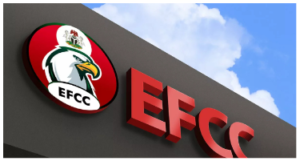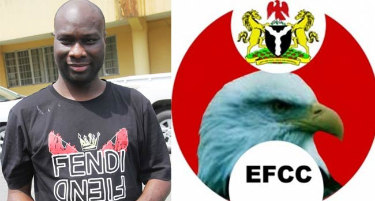On Saturday, the Economic and Financial Crimes Commission (EFCC) issued a robust challenge to internet celebrity Ismaila Mustapha, popularly known as Mompha, urging him to substantiate his corruption allegations against the agency’s operatives. This development adds a new dimension to the ongoing legal battle between the EFCC and Mompha, who is currently facing multiple charges related to financial crimes.
In an official statement, EFCC spokesman Dele Oyewale described Mompha’s allegations as “malicious and unsubstantiated,” emphasizing the agency’s commitment to integrity. Oyewale stated, “The claim, coming from an accused in a criminal trial for conspiracy to launder funds obtained through unlawful activity, retention of proceeds of criminal activities, failure to disclose assets and property, ought to be ignored as the rantings of a sinking defendant. But his claims strike at the heart of the Commission’s most prized value-integrity and must be challenged.”
The EFCC is particularly concerned about the impact of these allegations on its reputation and the integrity of its operations. The agency’s response underscores its resolve to maintain public trust and its determination to address any attempts to undermine its credibility.
Oyewale further explained, “The Commission is alarmed that the accused will abandon the platform offered by the court to launch a media war against it through spurious claims. If he believes that raising phantom accusations against the Commission will scare it from diligently prosecuting his case, he is mistaken as no amount of scaremongering will deter the Commission from pursuing the case to a logical conclusion.”
 The EFCC’s response highlights its frustration with what it perceives as an attempt by Mompha to distract from the substantive issues of his trial. Mompha is facing serious charges including conspiracy to launder funds obtained through unlawful activity, retention of proceeds of criminal activities, and failure to disclose assets and property. These charges form the crux of a high-profile case that has captured public attention due to Mompha’s celebrity status and the severity of the alleged offenses.
The EFCC’s response highlights its frustration with what it perceives as an attempt by Mompha to distract from the substantive issues of his trial. Mompha is facing serious charges including conspiracy to launder funds obtained through unlawful activity, retention of proceeds of criminal activities, and failure to disclose assets and property. These charges form the crux of a high-profile case that has captured public attention due to Mompha’s celebrity status and the severity of the alleged offenses.
In an effort to address the allegations head-on, EFCC Chairman Ola Olukoyede has directed that Mompha be invited to provide concrete evidence supporting his claims. The agency’s stance is clear: it is open to scrutiny and prepared to investigate any credible allegations of corruption within its ranks.
However, it also asserts that unsubstantiated claims will not derail its efforts to bring Mompha to justice. The EFCC has reiterated its commitment to transparency and accountability, key principles that underpin its operations and its mandate to combat financial crimes in Nigeria.
This confrontation between the EFCC and Mompha unfolds against a backdrop of heightened public scrutiny of Nigeria’s anti-corruption efforts. The EFCC has been at the forefront of these efforts, pursuing high-profile cases to demonstrate its resolve in tackling corruption. The agency’s vigorous response to Mompha’s allegations reflects its broader strategy to uphold its integrity and ensure that its work is not undermined by unverified claims.
For observers and stakeholders in Nigeria’s legal and financial systems, the outcome of this case holds significant implications. It not only tests the EFCC’s ability to maintain its integrity in the face of high-profile challenges but also serves as a critical barometer of the country’s anti-corruption initiatives. The EFCC’s insistence on pursuing Mompha’s case to its logical conclusion sends a strong message about its commitment to justice and its readiness to hold even the most prominent individuals accountable.
As the legal proceedings continue, the public will be watching closely to see how both Mompha and the EFCC navigate this complex and high-stakes confrontation. The agency’s call for Mompha to present evidence of corruption is a decisive move that could either validate or dispel the celebrity’s allegations. In the meantime, the EFCC remains steadfast in its mission, reaffirming its dedication to combating financial crimes and upholding the principles of transparency and accountability.




